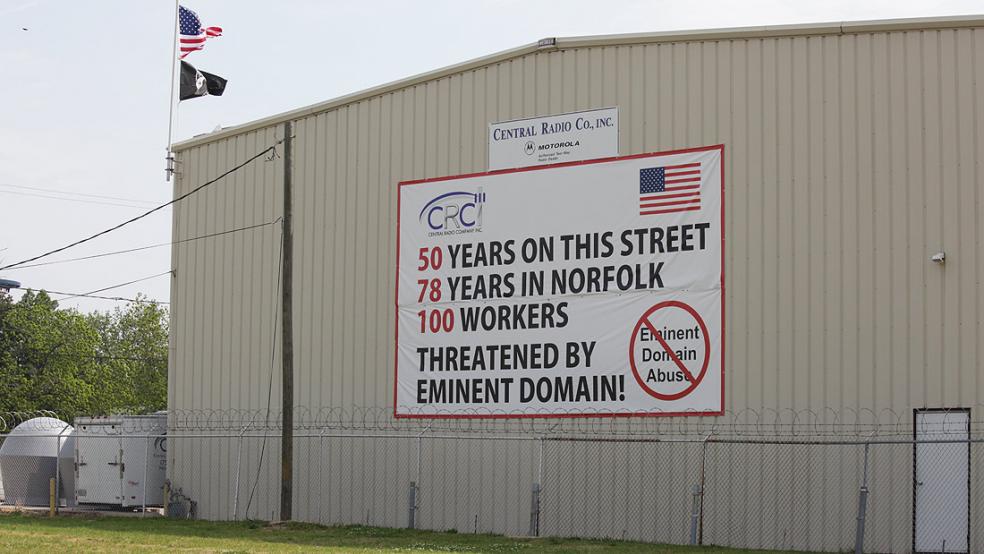Everyone complains about government, and real estate magnate Donald Trump is promising to fix it and make America great again. But no one can help the economy by encouraging the government to take people’s property. The Soviet Union, Cuba, and Venezuela have tried it without success.
Unfortunately, the Supreme Court in the 2005 Kelo v. City of New London case gave the government the right to take people’s property for any economic development project, a process called “eminent domain.” Susette Kelo’s house was seized so that New London could build housing, office space, and stores. Kelo’s house was destroyed, but the city’s project was never started. It’s yet another case of government planning gone awry.
Related: Here’s Why the Government Could Take Your House and Property—Legally
Encouraging eminent domain leads to corruption and cronyism, where friends keep their property and enemies lose it. It opens the door to bribery and extortion of campaign contributions.
Trump loves eminent domain. The most famous case of Trump trying to take away private property occurred in the mid-1990s. Vera Coking, an elderly widow, lived next to the Trump Plaza hotel and casino in Atlantic City, NJ. Trump wanted to build a parking lot for limousines on that property and several neighboring ones. When Coking refused to sell, Trump appealed to the Casino Reinvestment Development Authority to seize it via eminent domain.
Coking eventually beat Trump in Superior Court—the court held that “the primary interest served here is a private rather than a public one and as such the actions cannot be justified under the law."
In 1994, Trump tried to build a $350 million amusement park and shopping complex on the waterfront in Bridgeport, CT. However, five businesses occupied the area on which Trump wanted to build, so a scheme was devised to have the city of Bridgeport become a partner with Trump’s company, seize the land through eminent domain, and then sell the land to Trump.
Related: Takings and Tax Revenue--Fiscal Impacts of Eminent Domain
The deal was supported by Democratic Mayor Joseph Ganim, who eventually resigned (and spent seven years in prison) after it came to light that he had accepted bribes from people and companies doing business in Bridgeport. Trump’s project never came to fruition.
In 2015, Trump called eminent domain a “wonderful thing” on Fox News. “I happen to agree with it 100 percent. If you have a person living in an area that’s not even necessarily a good area, and … government wants to build a tremendous economic development, where a lot of people are going to be put to work and … create thousands upon thousands of jobs and beautification and lots of other things, I think it happens to be good."
Trump said that eminent domain often offers the targeted property owners much more than the properties are actually worth. But according to The New York Times, the Atlantic City property he tried to seize via eminent domain (for a limousine parking lot) was listed at nearly one million dollars, but the owner was offered only $250,000 by the CRDA, the government agency Trump appealed to in order to get the property seized.
Related: California High-Speed Rail Mired in Eminent Domain Controversy
More recently, Trump has stated, “But, you know, the way to eminent domain, if you didn't have eminent domain, you wouldn't have highways, you wouldn't have the Keystone pipeline, because they need their land desperately if it's ever going to get built. … You wouldn't have roads, you wouldn't have schools, hospitals. I mean, I don't love eminent domain, but you need eminent domain or you don't have a country."
Other Republican presidential candidates don’t share Trump’s view.
Senator Marco Rubio stated, “One of the most important rights Americans have is private property.” As chair of the Florida House’s Select Committee to Protect Private Property, he succeeded in curtailing such government power in Florida. Florida passed both a law and a constitutional amendment to restrict government land seizures in Florida. Now, exceptions to eminent domain protections need to receive a 60 percent majority vote in the Florida’s House and Senate.
Related: Trump’s Tax Cuts Would Add $24.5 Trillion to the Debt
Senator Ted Cruz has released an ad criticizing Trump on eminent domain. The ad states: “Trump bankrolled politicians to steamroll the little guy, a pattern of sleaze stretching back decades. Worse? Trump still supports eminent domain today.”
Cruz said, “Donald Trump has said he thinks eminent domain is fantastic and he supports using government power to seize private people’s homes to give them to giant corporations to say hypothetically build a casino. We have an obligation to protect the rights of Americans and private property is central to the rights of Americans.”
America cannot prosper by doing away with people’s property rights. To the contrary—it is only by solidifying property rights that people will be encouraged to take risks and make investments. And it is private investments that lead to economic growth and that will make America great again.
This article originally appeared in e21, Economic Policies for the 21st Century






